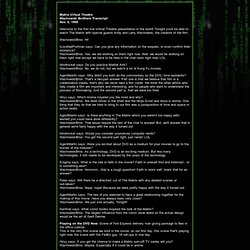

Gabe Newell believes brain interfaces will create games 'superior' to reality 'fairly quickly' Gabe Newell says the future of gaming may lie in brain-computer interface technology, or BCI for short.

In an interview with 1 NEWS, a television network in Newell's home away from home, New Zealand, the co-founder of Valve talks about his vision of what gaming might look like once powered by BCI tech and it sure sounds immersive at a level us mere mortals could hardly imagine—or existentially scary. Take your pick. Valve is currently working on an open-source BCI software project, he tells 1 NEWS, which would allow game developers to begin interpreting the signals within a players head while they play a game. "We're working on an open source project so that everybody can have high-resolution read technologies built into headsets, in a bunch of different modalities. " Newell says.
That sounds harmless enough, in a way. Monitoring motor function and signals can also act as an input device, those which could help reduce or remove the delay between player call and game response.
8 amazing works you may not have seen from anime's greatest directors. Behold the incredible places where we'll build cities in space. Another thought provoking article at io9.

Europa is a must-go-now destination. Forget about the very entertaining film of the same name, I want to see a global effort to send a submersible probe, outfitted with a drill to find passage beneath it's icy surface, and I don't want to wait twenty years for this to happen. OMNI Magazine Collection : Free Texts. From Wikipedia: OMNI was a science and science fiction magazine published in the US and the UK.

It contained articles on science fact and short works of science fiction. The first issue was published in October 1978, the last in Winter 1995, with an internet version lasting until 1998. OMNI was launched by Kathy Keeton, long-time companion and later wife of Penthouse magazine publisher Bob Guccione, who described the magazine in its first issue as "an original if not controversial mixture of science fact, fiction, fantasy and the paranormal". Classic European scifi movies you probably haven't seen - but you should. The Weekly Ansible, 50 Sci-Fi & Fantasy Works Every Socialist Should Read (by China Mieville) We Want To Hear Your Six-Word Science Fiction Tales! The World's Most Fascinating Places, As Seen In Science Fiction Books. Who Cares If Science Fiction Actually Predicts The Future? Science Fiction Does Something Way Better Than Predict The Future. Isn't it plausible to say it has created the future as well.

SciFi has influenced so many people, maybe influenced some to the point where they wanted to create what they have loved for so long. Examples are everywhere, especially with our latest technology. The Matrix Virtual Theatre. Matrix Virtual Theatre Wachowski Brothers Transcript Nov. 6, 1999 Welcome to the first live Virtual Theatre presentation in the world!

Did the very first science fiction magazine appear in Russia in 1894? 5 Essential Frank Herbert Novels That Aren't About Dune. There are probably several schools on this.

The Twenty Science Fiction Novels that Will Change Your Life. A Mosque Among The Stars available for free! A Mosque Among The Stars was the first anthology that dealt with the subject of Muslim characters and/or Islamic themes and Science Fiction.

It was edited by me (Muhammad Aurangzeb Ahmad) and the Canadian Muslim author Ahmad Khan. It came out in 2007. Now that it has been years since it was released in printed form, we have decided to release A Mosque Among The Stars to the public as a Creative Commons Licensed (Attribution-NonCommercial-NoDerivs) book. This means that you can download it for free and share with others as long as you dont make any changes to it and also do it for free. So without much further ado here is where you can download the book. Download the Book For the readers who are coming to this website for the first time be sure to check out my other sci-fi related Art-Project – Silicon Arabic. Was poet John Milton the father of science fiction? Image from Wikimedia Commons Before an ominous two-handed engine called “budget constraints” smote it into oblivion, a movie adaption of Milton’s Paradise Lost was slated to arrive in 2013.

Directed by Alex Proyas and starring Bradley Cooper as Satan, the film was billed as a science fiction actioner featuring 3-D “aerial warfare” between heavenly hosts and (probably) a lot of dark muttering about forbidden knowledge. Now Legendary Pictures has scrapped the epic, leaving us to contemplate our theology this Christmas without the promise of Cooper lolling around in a lake of fire, looking roguish. Katy Waldman is a Slate assistant editor. Science Fiction Under Totalitarian Regimes, Part 2: Tsarist and Soviet Russia. “Aelita is a planetary romance in which Los, a Soviet scientist and inventor, travels to Mars and, with the help of a Red Army officer, overthrows the fascist civilization there and institutes a Communist paradise.” - Well, this summary of the plot is, of course, wonderfully snappy with that added ironic underside of dismissive hindsight, but is utterly incorrect.

As anyone who has actually read the soviet ‘Princess of Mars’ knows, the two protagonists - ‘Los the engineer’ and ‘Gusev the red soldier of fortune’ – are at odds from the start. Los is a moody dreamer, content to remain on decadent Mars and maybe make love to Aelita, while Gusev can’t wait to stir up trouble. Pulp Science Fiction Under German Totalitarianism. Strange, yesterday came across old German pulp magazines as I was researching the whole Eurospy genre.

Rolf Torring, Kommissar X, Henry Cotton (of which they created a terrible, terrible reboot film) but most of all Perry Rhodan. 211, William Gibson. Get more interviews like this—plus fiction, poetry, art, and more—and subscribe to The Paris Review today! Vancouver, British Columbia, sits just on the far side of the American border, a green-glass model city set in the dish of the North Shore Mountains, which enclose the city and support, most days, a thick canopy of fog. There are periods in the year when it’ll rain for forty days, William Gibson tells me one mucky day there this winter, and when visibility drops so low you can’t see what’s coming at you from the nearest street corner.
10 Literary Devices, And Where You Can Find Them in Science Fiction. Classic SF of the 1950s: beautiful books introduced by Gibson, Gaiman, Reed, Willis, Straub and others. Metropolis: A Rare Film Programme for Fraitz Lang's 1927 Masterpiece. Original programme for the British premiere of Fritz Lang’s Metropolis in 1927. The world’s most valuable movie poster, for Fritz Lang’s 1927 masterpiece Metropolis, is to be auctioned again after making a record $690,000 in 2005. Ephemera related to the film is notoriously scarce, with only four copies of the poster known to survive. Almost as uncommon is this amazing film programme produced for the London premiere at the Marble Arch Pavilion on March 21, 1927, one of only three copies that we have handled.
Not only a list of cast and crew, it includes eleven short pieces on the making of the movie, commentary from the director and cast, and numerous production photographs and film stills, many attractively arranged as modernist collages. Recovered 1927 Metropolis Film Program Goes Behind the Scenes of a Sci-Fi Masterpiece. Always Coming Home by Ursula K. Le Guin - Reviews, Discussion, Bookclubs, Lists.
10 Science Fiction Novels You Pretend to Have Read (And Why You Should Actually Read Them) Here Are the 1960s Science Fiction Novels Everyone Should Read. Personally, I think it's an age thing, and society's evolving view of Nazis. The novel was published less than 20 years after WWII, and post-war nostalgia and pop culture was all about the US kicking some Nazi butt. Dick's alternate world where the Axis won was an interesting but unimaginable thought experiment for adults of the 60s.
Then Vietnam happened, and war wasn't cool any more, and WWII was our parents war. The Victorian Hugos: 1891. SExpand For anybody curious, the title image may be from somebody's flickr... but it's a picture (or copy) of "The Picture of Dorian Grey" by Ivan Albright. I remember stumbling upon that painting at the Art Institute in Chicago. How our predictions for the Year 2000 changed throughout the 20th Century. The 6 Most Important Sci-Fi Ideas (Were Invented by a Hack) The War of the Worlds by H.G. Wells is credited as one of the most influential science fiction books ever written, having introduced ideas like super-advanced aliens coming to Earth and said aliens hating the shit out of us and trying to wipe us out. Even though it was published as a novel all the way back in 1898, it's seen as the blueprint for every alien invasion blockbuster released more than a century later. This article isn't about that book.
In the same year, a writer named Garrett P. The Victorian Hugos: 1890. Watch Arthur C. Clarke predict the internet and the iPads decades before they were invented. Self Atomising Machines: Hypnagogic Cyberpunk, Reality and Utopia. What do you do when you find weird racism in old science fiction books? Bruce McCall Illustrates the Future That Wasn't. Ten Inventions Inspired by Science Fiction. Known as the father of the modern submarine, American inventor Simon Lake had been captivated by the idea of undersea travel and exploration ever since he read Jules Verne’s Twenty Thousand Leagues Under the Sea in 1870. Blade Runner cumple 30 años: curiosidades y vídeos de una obra irrepetible.
Tres años después de rodar Alien, Ridley Scott estrenaría una de las películas claves en la historia de la ciencia ficción. Basada en la novela de Philip K. Did this blogger just invent a new subgenre of science fiction? Thinking About Futurism. Before the Jetsons, Arthur Radebaugh Illustrated the Future. The Origins of Futurism. 10 Ultra-Weird Science Fiction Novels that Became Required Reading. 10 Weirdest Science Fiction Novels That You've Never Read. Science Fiction Society’s massive library is out of this world. Nearly 200 MIT students, alumni and local residents form MIT’s Science Fiction Society, which curates an enormous library containing more than 90 percent of all English language science fiction ever published.
Did Philip K. Dick disclose the real Matrix in 1977? Philip K. Dick rare interview in France, Part 1 - 1977. If it is realistic or plausible, then it is not science fiction. Why We Don't Like Creativity. William Gibson - Official Website. Nomadic utopianism. Science Fiction Conversations. The Complete History of Time Paradoxes. New invention brings us one step closer to an all-consuming, self-replicating grey goo.
Take a vacation to Arrakis with Dune travel posters. 10 Words You Might Think Came from Science (But Are Really From Science Fiction ) Robert Heinlein's predictions for the Year 2000 (from 1952) Science fiction writers have a job, and it's time to do it, says Neal Stephenson. Awesome graphic novels that even non-comics readers will love. The Death of Philip K. Dick and the Birth of Cyberpunk. Watch a complete 1990 documentary about cyberpunk, featuring a young William Gibson. The Victorian Hugos: 1887. When Will White People Stop Making Movies Like "Avatar"?
The many meanings of the dragon archetype in fantasy stories. I wrote 100 terrible short stories that I'm glad you'll never read. The Victorian Hugos: 1889. 10 Weirdest Scientific Theories Proposed in Science Fiction. 10 Futuristic Technologies That Will Never Exist. 2011 Hugo Awards: A good night for time travel, artificial intelligence, and Asimov's Magazine. 10 Science Fiction Books That Changed the Course of History. Hilariously optimistic 1954 magazine article proclaimed we'd all be piloting flying saucers by 1965.
10 Most Far-Fetched Future Dystopias. The Best Science Fiction and Fantasy Books of 2011. Read Arthur C. Clarke's original "Hammer of God" short story online. Why does Edgar Rice Burroughs still matter? Why Science Fiction Writers are Like Porn Stars. The 1986 infomercial for the Neuromancer movie that never was. Kim Jong-il is dead. Here's his monster movie. City of Treelike Buildings. Mutant Hunt = the best movie about robots doing drugs in human history. Your robots know that nature is a lie. An algorithm that makes robots appear more human. William Gibson explains why cyberpunk was made to be co-opted. 211, William Gibson. Wired 1.04: Disneyland with the Death Penalty. Rudy Rucker interview: "All these years, and I'm still looking for the big aha." 10 Recent Novels About the Future of Videogames. 1st Science Fiction Movie Filmed in Space Stays Underground.
Your Picks: Top 100 Science-Fiction, Fantasy Books. Five Science Fiction Technology Predictions That Came True. Hugo Gernsback. Document: The Symbolism Survey, Sarah Funke Butler. THE FIRST CON (1937) Mondo 2000. The Encyclopedia of Science Fiction. Blog/Vlog » Ghost in the Shell 2: Innocence. Ray Bradbury, 19 frases para celebrar su cumpleaños 91. Under a 'Frankenstein' Moon: Astronomer Sleuths Solve Mary Shelley Mystery. Ray Bradbury Remembered: NASA Pays Video Tribute to Sci-Fi Legend.